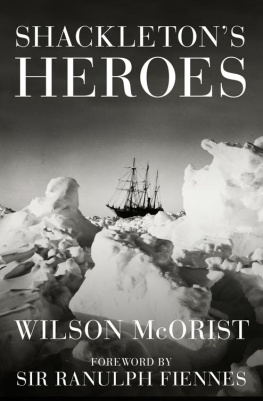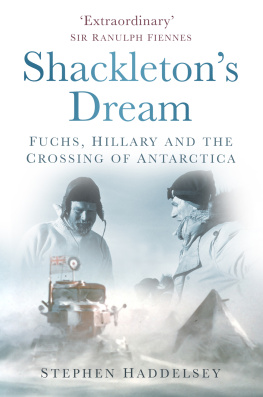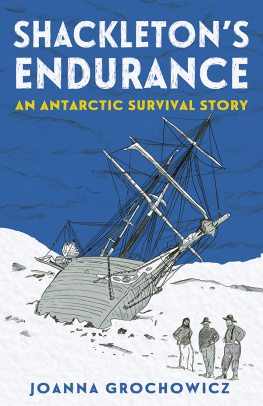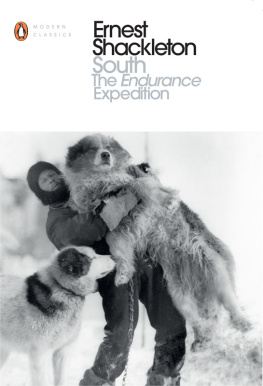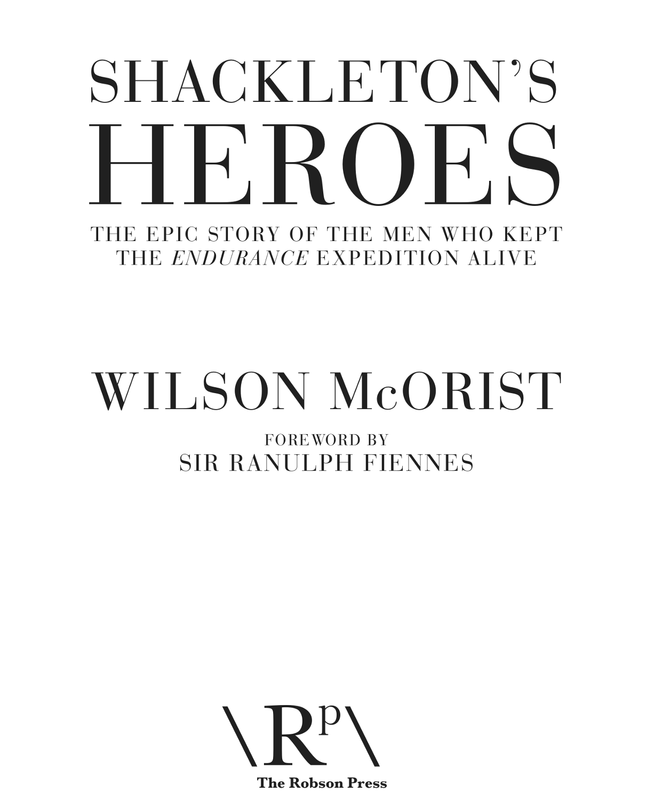AUTHORS PREFACE
THERE IS NOTHING quite like sitting at a table in the deathly silent Archives Room of the Scott Polar Research Institute Library in Cambridge, wearing white gloves, with a grimy, seal-blubber-oil-splattered diary, reading words that were written by one of your own heroes; words that were written in Antarctica in 191516.
My heroes are six men who were in a support party placing food depots for Shackletons planned crossing of Antarctica in 1915. I call these six men the Mount Hope Party because their most southerly depot was placed at Mount Hope, 360 miles onto the continent from their base at McMurdo Sound.
The rough, handwritten scrawl of their diaries often required a number of readings to ensure the words written were interpreted correctly. Did he write heavy or was the word leaving? Did he simply describe yet another day of hauling a sledge through waist-deep snow as worse than awful? Did he really write that they ate half a biscuit and drank one cup of weak warm tea, for the entire day? He mentions his toes does he not realise his toes are frostbitten, and they may need to be amputated? Does he have any idea that the blizzard will continue for another five days? Or that his colleague will die in two days? Such was my life, on and off, for six years as I researched the diaries of the men of the Mount Hope Party for this book.
Over this time I badgered the staff at various institutions for any diary, document, letter or journal related to the Mount Hope Party: the Scott Polar Research Institute in Cambridge, the Canterbury Museum in Christchurch, the James Caird Library at the National Maritime Museum in London, the Royal Geographical Society in London, the Alexander Turnbull Library in Wellington and the Federation University in Victoria (formerly University of Ballarat).
I searched for more details of the six men: Mackintosh, Joyce, Wild, Spencer-Smith, Hayward and Richards. I spent time with Anne Philips, granddaughter of the leader of the party, Aeneas Mackintosh, and she gave me even more background information on him. I tracked down Ernest Joyces original diary (in private hands in the USA) and the owner, Betsy Krementz, obligingly sent me a complete copy of it for my work. I visited obscure places like the tiny village of Eversholt, the home of Ernest Wild. I met the late Michael Weaver, archivist at Woodbridge School in Suffolk, who was also entranced with the exploits of a past pupil, A. P. Spencer-Smith. I wrote to hundreds of people named P. Hayward before finding Peter Hayward, the grand-nephew of Victor Hayward, who shared with me the history of his family. I had tea and biscuits in Adelaide with Dick Richardss daughter, the most charming nonagenarian, Patricia Lathlean.
We can hardly imagine what life was really like in Antarctica in the early 1900s, so I travelled there on the Heritage Expeditions ship Spirit of Enderby to try and gain a better understanding of the Antarctic environment, and the conditions under which the men lived. Invercargill in New Zealand was our starting point at latitude 46 S and our destination was McMurdo Sound in Antarctica, latitude 77.5 S. Day after day the ship rolled its way across the Southern Ocean, covering no more than a few degrees of latitude each day. We encountered wild weather and rough seas. We saw our first icebergs drifting up from the south. Like past explorers we were stopped by pack ice. After ten days at sea we could see Antarctica, highlighted by the ice cliffs of the Great Ice Barrier. In the distance we could see the Trans-Antarctic Mountains, a range of mountains that went southward into Antarctica. We were in the hallowed ground of Scott and Shackleton. We had reached McMurdo Sound.
We stood silently by bunks at the Cape Evans hut (abandoned by Captain R. F. Scotts expedition of 191013) that the men of the Mount Hope Party had slept on. We read a scribbled inscription on the wall by Dick Richards and, in the dim light, wondered who wore the blubber-stained improvised canvas trousers. We saw unopened tins of McDoddies dried vegetables on the shelves. We saw a game of Bobs that the men entertained themselves with over the winter months. We stared unbelievingly at a pile of seal blubber, stacked by the men of the Mount Hope Party in 1916, frozen and untouched since that time. Outside the hut we were transfixed by the anchor and broken cables from the ship Aurora, embedded in the gravel beach since May 1915. At Discovery hut we walked around the one blubber stove, with a frying pan still on the plate, complete with seal chunks, also frozen and untouched for almost 100 years. We saw the few wooden planks raised up from the floor which men slept on during winter. We walked up the hill nearby where, in 1916, three men of the Mount Hope Party watched two of their comrades attempt to walk to Cape Evans, only 13 miles away.
We attempted a trek up Observation Hill, a prominent landmark at the foot of McMurdo Sound, but a sudden blizzard came on when only half the ships party had reached the summit so we were forced to return to the ship. It was probably nothing more than a strong wind with snow drift, but we experienced a little of what the men of the early 1900s may have experienced; we in our fleecy underwear and duck-down windcheaters, they with frostbitten fingers and toes, wearing worn and threadbare clothing.
But even with a trip to Antarctica, and armed with a mass of information from diaries, books, letters and journals, I found it impossible to accurately convey how and why these men of the early 1900s acted the way they did. One could make assumptions, surmise and guess, but what was the true story of the Mount Hope Party? Then I realised that the story could be told; by the men themselves. We have their diaries, almost all of them. And on most days we have a number of diary entries by more than one man to describe what happened. There are even explanations as to why they took a certain step, or what they thought of another mans action or what was on their own mind. Their private thoughts are in the diaries. There is no better way to learn about the heroics of the six men of the Mount Hope Party than for these men to tell the story, in their own words and that is through their diaries.
A number of relatives of the Mount Hope Party, and others who own copyright, have kindly given me permission to publish diary extracts. These include:
Anne Phillips, the granddaughter of Aeneas Mackintosh.
Betsy Krementz, the owner of Ernest Joyces original diary.
Julie George (Francis) and Judy Murray, relatives of Ernest Wild.
Debby Horsman and Clifford Smith, relatives of Arnold Patrick Spencer-Smith.
Peter Hayward, grand-nephew of Victor Hayward.
Canterbury Museum in Christchurch, New Zealand, who have copyright of Richard Walter Richardss diary.
My talented brother Ian McOrist has added to the diary words with maps and my equally talented sister Jessie-Jean Walker has painted the portraits of the six men of the Mount Hope Party. Dr David Harrowfield, the Antarctic historian and geographer, offered to read my manuscript and made a number of excellent suggestions which I have incorporated. He has written a Postscript for which I am most grateful. I am indebted to Sir Ranulph Fiennes for his Foreword.
To Sheila Drummond and Anna Carmichael I am especially grateful, who, as literary agents, saw some value in my work, as did Heather Lane at SPRI. I have a special thank you for Victoria Godden, the Editorial Assistant at Biteback Publishing. Her attention to detail in the final editing and correcting of my manuscript was absolutely brilliant.
And last to thank is the lady who for years has put up with me idolising men from 100 years ago. Enough is enough, Suzanne said, so she decided to help, and more than help, she edited my book from page one to the end.

